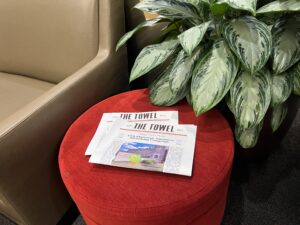CUA Should Have Cancelled Classes for Election Day

Image Courtesy of socialworkers.org
By Caroline Morris
When students tour the Catholic University of America, they are promised one thing: every student will be in Washington, D.C. for a presidential election. This year, however, that oath has been broken.
Students from Catholic University are scattered all throughout the country for this election circuit because the COVID-19 pandemic precluded the majority of students from living on campus. We all know the issues this poses for academics and mental health, but Election Day presented a different issue for many students: the ability to vote.
Normally, it would be understandable for colleges to not cancel classes for Election Day as students are likely to be out of state or away from their typical polling location. This mindset, of course, does not take into account the professors that may need to vote. But it is understandable for a university to keep classes going during a typical election year when most, if not all, students will have to vote by absentee ballot anyway.
This is no typical election year. Given this drastic difference to the lived reality of Election Day for students, Catholic University should have canceled classes for the day to promote students to participate in their civic and Catholic duty to vote.
Many students who have been kept off campus by the university are living in their home states and thus can vote in person. This ability to vote in person drastically affects how Election Day looks for a student. Rather than just filling out and mailing in an absentee ballot from McMahon, now students may go to vote in person if they did not request a mail-in ballot.
Mail-in ballots are more popular than ever this year given the pandemic and a desire to minimize public outings, but not everyone opts for this choice. Not only is there the fear that mail-in ballots may be contended and not counted if they arrive after Election Day, but students may not have realized that mail-in ballots were an option until the registration deadline had already passed, or could have hit some other snag that necessitated an in-person vote.
Junior biology major Benjamin Ballway lives in New Jersey and needed to vote in person because of a hiccup with his mail-in ballot. He anticipated needing an absentee ballot for an in-person school year, but the university switched juniors to online learning at the last minute. Ballway then had to cancel his absentee ballot which meant he had to vote in person.
In-person voting is a reality that Catholic University should have considered and respected. Not only as Americans but also as Catholics we have a duty to vote so that we can play a part in shaping our country after the morals and ideologies in which we believe. But this ability to vote in person was hindered by the university’s decision to keep classes for the day.
Having classes staggered throughout the day impedes the ability to vote. We are in the middle of a pandemic and an extremely contentious election. For students who are first-time voters like myself who have no idea how long voting may take and the best times to go vote to avoid lines, voting on a school day poses a real problem. Not only that, but we are in the middle of a pandemic. Wait times in lines to vote could be protracted exponentially because of social distancing guidelines.
Voting in person poses a real timing issue to students who have their classes staggered throughout the day. This then causes students to choose between voting or their classes, which is a choice no one should have to make.
I live in Pennsylvania, which is an incredibly important player in this election. Fearing that voting would conflict with my classes, I intended to vote early in-person on October 30th, only to realize that early in-person voting ended a week before Election Day on October 27th. Family friends who had voted early in-person told horror stories of extremely long lines that made me worry that I would miss my classes if I went to vote on Election Day, or that I would arrive too late and not be able to vote.
In order to make sure I could vote, I woke up at 7 a.m. on Election Day after going to sleep at 2:30 a.m. after staying up late doing homework. I then bundled up to wait in the outdoor line.
I am not the only student who had a difficult time voting. Senior management major Juan Mier lives in Puerto Rico and also suffered difficulty in voting. Puerto Rico does not have daylight savings, so his daily schedule was already affected by online schooling. But not only did Mier have class on Election Day, he had a test, which again reinforces the conflict for students of prioritizing school work or voting.
“I had a test today, so I ended up finishing it at 12,” Mier said. “By that time lines were long and I ended up waiting an hour and a half to vote.”
Neither of these are exactly ideal voting scenarios, and there is no guarantee that all students who faced this conflict would have chosen to vote. By not canceling classes, Catholic U made it much more difficult for students to practice their right to vote, and possibly stopped students from voting. Keep in mind that this semester already has an extra week added due to the university’s initial plan to have students back early for the semester and to send them home after Thanksgiving. The university already gave us an extra week of school arguably during one of the most difficult periods of our young lives, and they did not spare us a single day so that we could go vote.
American University and George Washington University both canceled classes for Election Day. Both of these D.C.-based universities with students doing online schooling realized the importance of voting and acted to encourage students to vote. Catholic University did not follow in their stead to help its students’ voices be heard, but rather impeded them.
Catholic University failed its students in this choice and sadly will not have the opportunity to make it right.







